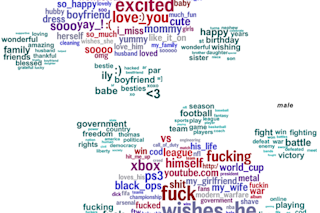Figure 3. Words, phrases, and topics most highly distinguishing females and males. Female language features are shown on top while males below. Size of the word indicates the strength of the correlation; color indicates relative frequency of usage. Underscores (_) connect words of multiword phrases. Words and phrases are in the center; topics, represented as the 15 most prevalent words, surround. (: females and males; correlations adjusted for age; Bonferroni-corrected ).
File this under "reinforcing stereotypes": these scientists use word clouds created from the Facebook messages of 75,000 people to reveal not only the differences between men and women (fighting, football and xbox vs. babies, emoticons, and shopping), but between introverts and extroverts (anime and computers vs. parties and 'chillin'). If this hasn't paralyzed you from depression, continue reading for a peek at the rest of the word clouds in all their glory. xD
Personality, Gender, and Age in the ...














